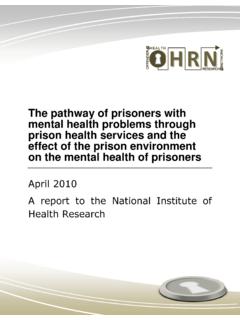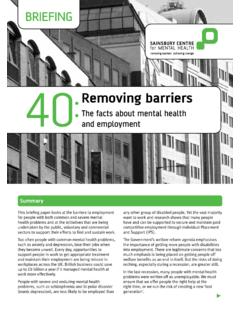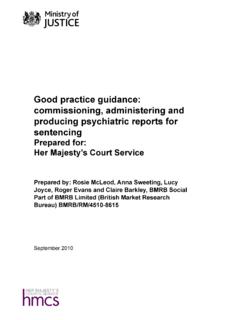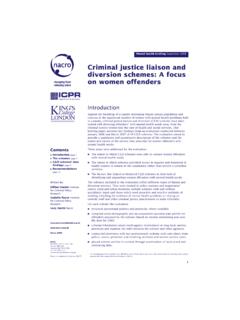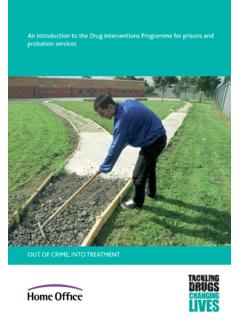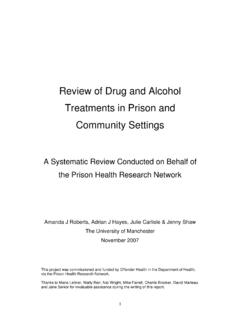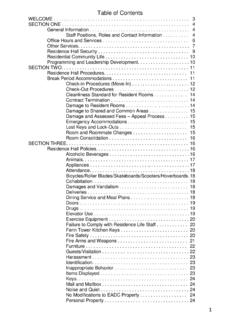Transcription of N O N E K N O W S - OHRN
1 No One Knows: offenders with learning difficulties and learning disabilities - review of prevalence and associated needsooffffeennddeerrss wwiitthh lleeaarrnniinngg ddiiffffiiccuullttiieess aanndd lleeaarrnniinngg ddiissaabbiilliittiieess-- rreevviieeww ooff pprreevvaalleennccee aanndd aassssoocciiaatteedd nneeeeddssNNOOOONNEEKKNNOOWWSSNN aannccyy LLoouucckkssThe work of the Prison Reform Trust is aimed at creating a just, humane and effective penal this by inquiring into the workings of the system; informing prisoners, staff and the wider public; andby influencing parliament, government and officials towards reform.
2 2007 Prison Reform TrustAll rights reserved. No part of this publication may be reproduced or transmitted, in any form or by anymeans, electronic, mechanical, photocopying, recording or otherwise without prior permission of thecopyright report was written by Nancy published in 2007 by Prison Reform TrustFor further information about No One Knowsplease contact Jenny Talbot on 020 7251 5070 vExecutive 7 Definitions ..7 Links between learning disability/learning difficulties and issues ..13 Studies of people known to services for learning of offenders ..14 Self-report studies ..17 Learning difficulties.
3 18 Ways in the criminal justice the criminal justice of community-based in from the criminal justice in in outside for offenders outside the criminal justice of good One Knows: offenders with learning difficulties and learning disabilities - review of prevalence and associated needsiiNo One Knows: offenders with learning difficulties and learning disabilities - review of prevalence and associated needsiiiNo One Knows: offenders with learning difficulties and learning disabilities - review of prevalence and associated needsAAcckknnoowwlleeddggeemmeennttssWor k such as this is never the result of a sole effort.
4 I am extremely grateful to thosewho agreed to be interviewed for the research, namely Ruth Andrews from theNorthgate and Prudhoe and Northumberland,Tyne and Wear NHS Trusts; Isobel Clareand Tony Holland from the University of Cambridge; Fergus Douds from the StateHospital at Carstairs; Mary Gilfillan, Ewan Lundie, Stewart MacFarlane, and LesleyPaterson from the Scottish Prison Service; Pamela Hazel,Alison McCaughan(contracted in), and Michael Scott from the Northern Ireland Prison Service; andWendy Silberman from the National Development Team in England. Isobel Clare alsokindly read through the final also to members of the Advisory Group for No One Knowsfor theircomments and insight, but especially to Glynis Murphy and Karen Bryan for theirdetailed reading of the drafts and to Andrew Fraser for his assistance with thebackground material.
5 Judith Williams and Catherine Atthill's early work for No OneKnowsalso proved extremely useful in providing the context for much of this especially to Jenny Talbot, project manager for No One Knows, for hercommitment, her organisation, her tremendous support, and her unfailing enthusiasmfor the programme, and indeed to all at the Prison Reform are grateful toThe Diana, Princess of Wales Memorial Fund for supporting this but not least, thanks to my husband Niall and daughters Freya and Savanna fortheir support and for their patience with my neglect of them while I work. I hope theyagree the effort has been One Knows: offenders with learning difficulties and learning disabilities - review of prevalence and associated needsvNo One Knows: offenders with learning difficulties and learning disabilities - review of prevalence and associated needsFFoorreewwoorrddThe number of people with learning difficulties and learning disabilities caught up in thecriminal justice system is a matter which has long troubled those who manage criminaljustice services.
6 In 1999, a prison governor writing in the Prison Service Journal have a young offender who is due for release Everyone working with thiswoman accepts that she should not be in prison. She is severely learning disabled as aresult of a physical abnormality of the We know that regardless of court diversionschemes, many like her slip through the Perhaps the courts think such people areinsolent when they don t reply. In fact, when we had one of these women assessed wediscovered that she had a mental age of between seven and eight. Governor, HMP Styal Responding to such concerns the Prison Reform Trust has launched a new programme,No One literature review brings together authoritative research on the prevalence andassociated needs of offenders with learning difficulties and learning disabilities.
7 Itdemonstrates for the first time the vast hidden problem of high numbers of men, womenand children trapped within the criminal justice , even within strict definition of learning disabilities or specific learning difficultiesagreed levels of prevalence are not is currently no routine screening orassessment of offenders for learning difficulties or learning disabilities and where screeningor assessment does take place, different tools are used which yield differing research has helped in this review shows that between 20-30% ofoffenders have learning difficulties or learning disabilities that interfere with their ability tocope within the criminal justice are at risk of re-offending because ofunidentified needs and consequent lack of support and services; are unlikely to benefitfrom conventional programmes designed to address their offending behaviour.
8 Aretargeted by other prisoners when in custody and present numerous difficulties for thestaff who work with them, especially when these staff often lack specialist training or areunfamiliar with the challenges of working with this group of programme of work is not one that can be carried out by the Prison Reform Truston its own. I am therefore very grateful to the number of people and organisations acrossthe criminal justice system, education, health and social care that are providing help,guidance and support, in particular Mencap, which is a partner organisation of No Quinchair of the advisory groupviNo One Knows.
9 Offenders with learning difficulties and learning disabilities - review of prevalence and associated needsEExxeeccuuttiivvee SSuummmmaarryyBBaacckkggrroouunnddIn 2005, the Prison Reform Trust received funding from The Diana, Princess of WalesMemorial Fund to examine learning disability and learning difficulties amongst programme,No One Knows, seeks to gain a better understanding of the experiences ofthis group within the criminal justice system and to identify how their needs can beaddressed. This summary outlines the review of prevalence and associated needs compiledto provide background information for the One Knowsexamines both learning disabilities, as defined in the Valuing People WhitePaper (Department of Health 2001), and learning difficulties, which include a wider range ofissues such as dyslexia and Asperger s syndrome.
10 The focus is less on intellectual functioningas on adaptive issues that impact upon a person s experience in the criminal justice research in the UK and internationally, on the other hand, follows a relatively strictdefinition of learning disability based on IQ measures of 70 or below, or focuses on dyslexiawith relatively limited reference to other learning evidence in the literature internationally is far from clear whether people withintellectual impairments or learning difficulties commit any more offences than thosewithout such impairments. Both social and biological factors appear relevant, particularlyfor people with borderline intellectual within strict definitions of learning disability and learning difficulty, no agreed levels ofprevalence are evident.
